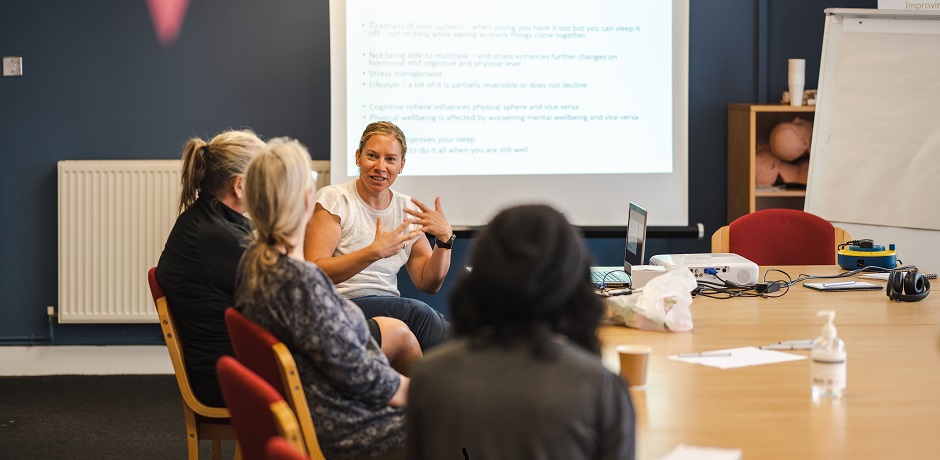)
Removing the barriers to social care research in practice
While awareness of the importance of social care research in practice grows, there remain many barriers to practitioner engagement with research. Here Karen Nixon, Deputy Dean of the Social Work Learning Academy at the Midlands Partnership University Foundation Trust, discusses her new STARSWARS project developing a tool to support practitioners to deliver research. This is part of her new Practice Based Research Leader Fellowship (PBRLF) with the NIHR School of Social Care Research.
Practitioner perspectives on research
Within social care environments we often hear of research as a vital tool to improve practice, create opportunities to deliver evidence-informed change and as a process to identify areas of excellence and recommendations of improvement.
However, my recent work within the SCREEN (Social Care Research EngagemENt) project at Midlands Partnership University NHS Foundation Trust (MPUFT) identified that whilst research may be considered a central component to achieve evidence-informed practice, practitioners mostly found research to be inaccessible. Practitioners often lacked time to undertake research activity, and in many circumstances were not familiar with learning or developmental materials in which to support research within everyday practice. Many described current research skill training and learning as being placed within a medical-based context and lacking relevance to social care practice.
STARSWARS: a new hope for social care researchers
How, then, do social care practitioners undertake research activity in a profession often described as pressured, lacking time to look up from the day job, and without an identifiable infrastructure that easily translates research outputs to transformational change?’ I successfully bid to the NIHR School of Social Care Research (NIHR SSCR) for a Practice-Based Research Leadership Fellowship (PBRLF) to conduct research on this topic.
Working alongside a team of academics and social care practitioners from MPUFT and Keele University my vision is to create a research engagement development platform ‘Built by Social Care for Social Care’ that we have named STARSWARS (Supporting The Advancement of Research Skills Work AcRoss Social care).
With the aim to champion the social care voice, the STARSWARS platform will firstly tackle issues of engagement and relevance by illustrating the value of research to social care practice. From that it will develop and review research training and learning content that is anchored to case examples, importantly using experiences and language with which social care practitioners are familiar. Whilst research training and learning content exists – indeed STARSWARS is based on the highly successful MPUFT STARS programme (Supporting the Advancement of Research Skills) – many social care practitioners are not aware of such content or how to access and apply to social care contexts. Thus, within STARSWARS social care practitioners will be supported to become research-familiar, to undertake their own research activities, and where relevant will be supported to change and develop practice and process.
Feeling the force of practitioner researchers
Sharing this vision during the NIHR School of Social Care Research’s Annual Conference (London, April 2023) I found the most valuable messages arose from those that emphasised the requirement of research activity at a practice level. Indeed, a central theme from PBRLF colleagues Rachel Scourfield, Liza Turton, Elaine James and Ryan Cowley-Sharp (who presented during the conference) emphasized that to create impact and meaningful change is to ‘create, champion and deliver’ an improved research culture within social care practice settings.
Importantly, whilst researchers argued for the creation and delivery of change within their presentations during the conference, which ranged from the role of intimacy and inclusivity when ‘Supporting autistic adults intimate lives’ (Monique Huysamen, Manchester Metropolitan University) to Understanding the division of household labour from a young adult carer’s perspective (Camille Bou, London School of Economics and Political Science) my observation is that to enable research to be truly deliverable within practice settings requires dedicated time for social care practitioners to undertake research activity, to trial study recommendations, to evaluate and to celebrate when research and innovation makes a difference to practice on the ground.
In my role as a PBRLF I believe that, as I said at the conference: “Research is about real experiences, it’s about recognising the factors that mean the most to people, it’s about leaders championing a research culture, raising the profile, developing skills and importantly sustaining quality of practice and improvement to the lives of the people we serve.”
Read NIHR Social Care Speciality posts here →




